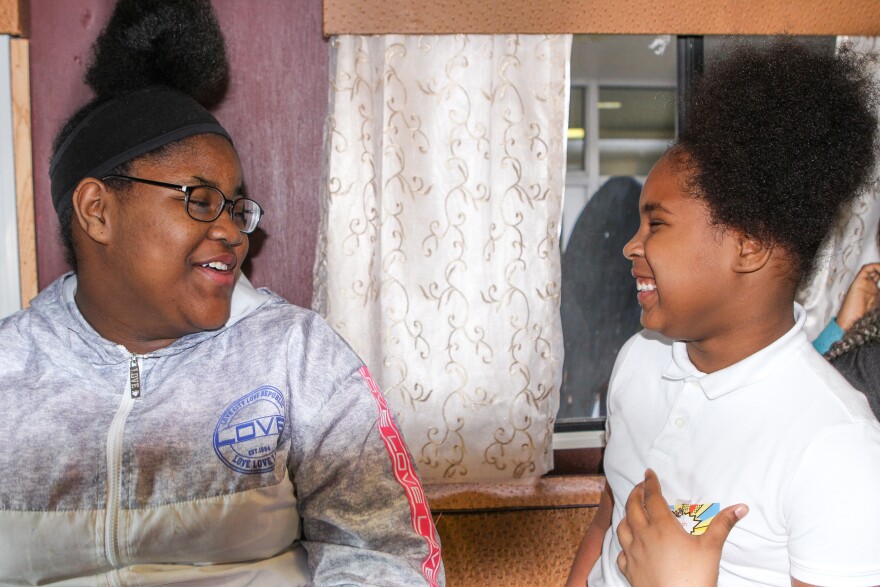Queen Roshae shows a group of girls onto the mobile salon bus. They giggle and whisper as they climb aboard, one by one plopping seats on a long bench. School’s out and they’ve come to the Central Community House to wait for their parents to get off work.
“We are doing an outreach program, if you will,” Roshae says. “So we’re going out to the community centers, our second chance high schools, job corps, anything of that nature.”
Roshae runs Napps, Kinx & BBs natural hair salon on Westerville Road. Styling hair wasn’t her plan as a kid, but she’s glad that’s how she makes her living.
“I love it. It’s fun for me. And I figured out how to monetize it and create it, cultivate a business for myself,” Roshae says. “This is a multi-billion dollar industry. It wasn’t hard to do, but I did not know I was in business. Certainly not at 14, 15, 16 on a porch.”
Now that Roshae knows the business, she wants to teach the next generation of black kids how to turn hair into a career. She bought an old bus for $1,000 and turned it into a mobile salon, taking her Hair Matters classes where they’re needed most.
Barriers To Entry
Natural hair licenses are still relatively rare in Ohio: the state issued just 62 licenses between 1999 and 2014. Because the licenses require 450 hours of training, stylists often worked off the books or got a lower state certification known as a boutique services registration, which became available in 2016.
But the law allowing those registrations is only in effect until April 5.
Zyarah Evans, 10, comes to the Central Community House every day after school. She loves to do hair.
“When I was little I used to play with my hair a lot," Evans says. "I used to try to do it. I used to put stuff in my hair."
She knows she has a lot to learn if she wants to style other people’s hair.
“I just now need to learn how to like start the braids off and how to knot it when I’m finished, and all type of different things,” Evans says.

Evans is among the elementary and middle school girls Roshae will teach to do hair over this spring and summer. Beyond lessons, though, Roshae also wants to provide mentorship to the girls.
“The mentoring piece is just finding out about them. What do you want to be when you grow up?” Roshae says. “Right now everybody want to be a hairdresser, or so they say, so we take that and cultivate more of their career ideas to their future goals.”
Not everyone is set on the path, though. One girl who declined to be interviewed said she wanted to be a doctor. Roshae’s expertise may be hair, but she wants to empower young girls to follow dreams of all kinds.
"I'll Bring The Barber To You"
Roshae has already helped 20 others get their natural hair license. That includes Paiden Williams, 19, who goes by the name Slim. She now volunteers for the Hair Matters bus.
“Actually being able to get in there and see the way the business is ran, the way the money flows, see the way the service is supposed to be, all the things you need to produce a good business to brand,” Slim says.
Slim has used her license for freelance hair gigs all around the state. She wants to join Roshae in empowering other girls to do the same.
“Roshae can’t get rid of me,” Slim laughs. “I love hair also. Just braiding hair, all types of hair. And just bringing young girls on board, like, ‘Oh, I wanna do hair!’ But they just don’t know the steps you have to take.”

Roshae is expanding the training opportunity to others who may not be able to afford it. The whole process of obtaining a natural hair license can cost over $1,000.
“We created a scholarship initiative," Roshae says. "So for every shampoo assistant tuition-paid, which is about $1,200. That’s their kit and everything included, like t-shirts and field trips."
For every person who pays for a natural hair license through Napps Academy, Roshae will pay for two kids to get their license. She wants to focus on kids who are aging out of the foster care system and need a skillset.
A Columbus Foundation grant funds the effort with Central Community House. Arts programmer Katerina Harris says this will help black kids form connections with professionals who look like them.
“Because all of the children in our middle school program are black," Harris says. "And making sure they have black outlets and seeing professional black folks do their jobs.”
Roshae hopes the bus’ mobility will be fun for young mentees, but also a way to help people who struggle to find transportation.
“It’s hard to shuffle maybe five, six, seven kids as a CASA volunteer. I’ll bring this bus to you. A foster parent,” Roshae says. “You’re fostering four to five kids who need haircuts? I’ll bring the barber to you.”
Roshae also plans to partner with the Urban League in the future. She hopes to take the bus to other area programs and community events, and eventually across state lines.






